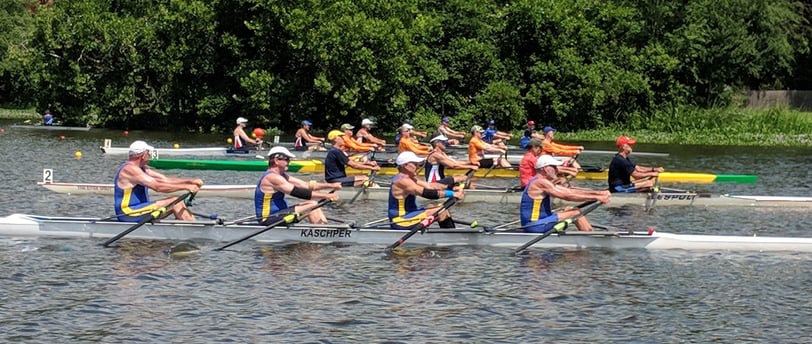Rockland Masters Regatta: Speed, Not Age
This year's Rockland Masters Regatta is introducing a new paradigm...seeding masters by speed rather than age.
RegattaPros
6/27/20254 min read


I remember it like it was yesterday...coxing at the Carnegie Lake Regatta in the summer of 2009. Our crew had one of the fastest, cleanest races I had ever experienced. Smooth ride, crossing the line well in front of any other crew.
Then...we sat just beyond the finish line and watched...mentally trying to count down as other crews crossed and trying to do the mental math just to have an idea of whether or not we had done enough to overcome the other crews' handicaps.
Spoiler...we didn't. Despite crossing the finish line with open water before anyone else, not only did we not win the race, we didn't even medal, ultimately finishing in 4th.
That's when it hit me...I hate handicaps!
Masters Handicaps - A Necessary Evil?
Look, I understand the need for handicaps. As I've experienced more regattas at the local level, more often than not there simply are not the numbers of crews within a close enough age range to justify not using handicaps.
When the former Masters Nationals method of awarding medals to the winner in each category is tried at the local level, in typically turns into everyone in the race getting a medal. Generally, this is met with a "meh" response from masters. Those who are on the more competitive side want to actually compete for their medals, and the ones who are either new to racing or more interested in the sport recreationally, though pleasantly surprised to win a medal, they are just not motivated by it one way or another.
But, the athlete experience I described above...doing handicap math on the water, having a great race and coming away empty...it is a terrible experience. But, it has become the norm for masters, something they have had to settle into for so long that they've had to find their way to be comfortable with it over time.
Solution - Speed, Not Age
What if it didn't have to be that way? What if there was a way that you could go to a regatta, get paired into competitive races, and factoring the natural affects of age into the results.
How do we avoid the athlete experience of crossing the line first, just to not win a medal, but also not turn the event into feeling like everyone is getting a participation medal?
This year's Rockland Masters Regatta is making an attempt at providing a solution by focusing on speed, rather than age, to group crews together.
Time Trials? For Masters?
To group crews by speed, that does involve utilizing some type of time trial to set the bar for a crew's speed for a given race.
This is common in just about any racing sport. Car racing, whether NASCAR, Formula1, or NHRA, all include some type of "qualifying" round that then seeds the competition portion of the event.
Within rowing, I have the unique experience of being the one to bring time trials into broad usage at the Youth regional and national level. Though there's more background to the story of that change, one of the factors was finding more ways to bring objectivity to seeding processes at these championship level events.
My experience introducing time trials has also helped me to become familiar with the typical complaints for them. Frankly, I identify with them. It is not much fun to come to a regatta, then do a "boat parade", head race style time trial, then to get either eliminated or moved out of medal contention and into a lower level "final".
The solution being tried at Rockland? What we're calling "Henley-style" time trials.
Standard time trials operate with crews staggering their starts between lanes, resulting in crews racing against the clock. Many masters spend their week doing these types of rows, so traveling to a regatta to do it again is not particularly interesting.
Instead, we will start crews together in pairs. So, while your results are still compared across the event like with a standard time trial, crews will get the experience of racing side-by-side and head-to-head, with another competitor. And, with these seeded by age, you are more likely to race directly next to someone of similar age.
Competitive Racing, Medals for Age Categories
The time trials lead to finals races that are seeded by speed. So, the athlete experience on the water will be one where they are matched up with someone close to their age in a "head-to-head" feeling experience in the time trial, followed by a final where they are in a field of crews that have demonstrated similar speed.
However, the range of ages, and the obvious natural affects of age on speed, cannot be ignored. So, the Rockland format will still award medals to the winner of each age category.
Willingness to Innovate
The hope is that bringing this more competitive overall experience will result in crews feeling like they still had to work for their medal, even if they are the only one in their category. They should be in a much more competitive field than if they were just placed in a flight.
If nothing else, the uniqueness of this format will bring a change to the monotony of the masters rowing calendar. At the local level, many of these crews are familiar with each other, have been racing the same people for years, and can almost predict the results before they get to the regatta. By being willing to try something new, Rockland Rowing Association is offering these athletes a chance to potentially be in a race where that person that always wins is maybe in a different final, so you have a chance to give it a go against some new faces. Or, tighten the field so that the slower crews are in contention longer than they may normally be.
Over our three years helping bring the Rockland Masters Regatta to life, their willingness to innovate has been one of the funnest parts of the experience. Finding ways to offer masters athletes a different experience is something that has always been part of the fabric of this event, and the Rockland Rowing Association leadership has jumped full into it with this year's ground-breaking format.
As with any innovation, there is risk involved. Who knows, if you're a masters rower reading this in 2035, when this format is prevalent across the country, it may not seem ground-breaking anymore. Or, this could end up as a quirky footnote in the history of the R0ckland Masters Regatta.
But, the people and organizations willing to take the risk to innovate should be applauded for having the courage to try it.
Follow the 2025 Rockland Masters Regatta results to see how things work out.
